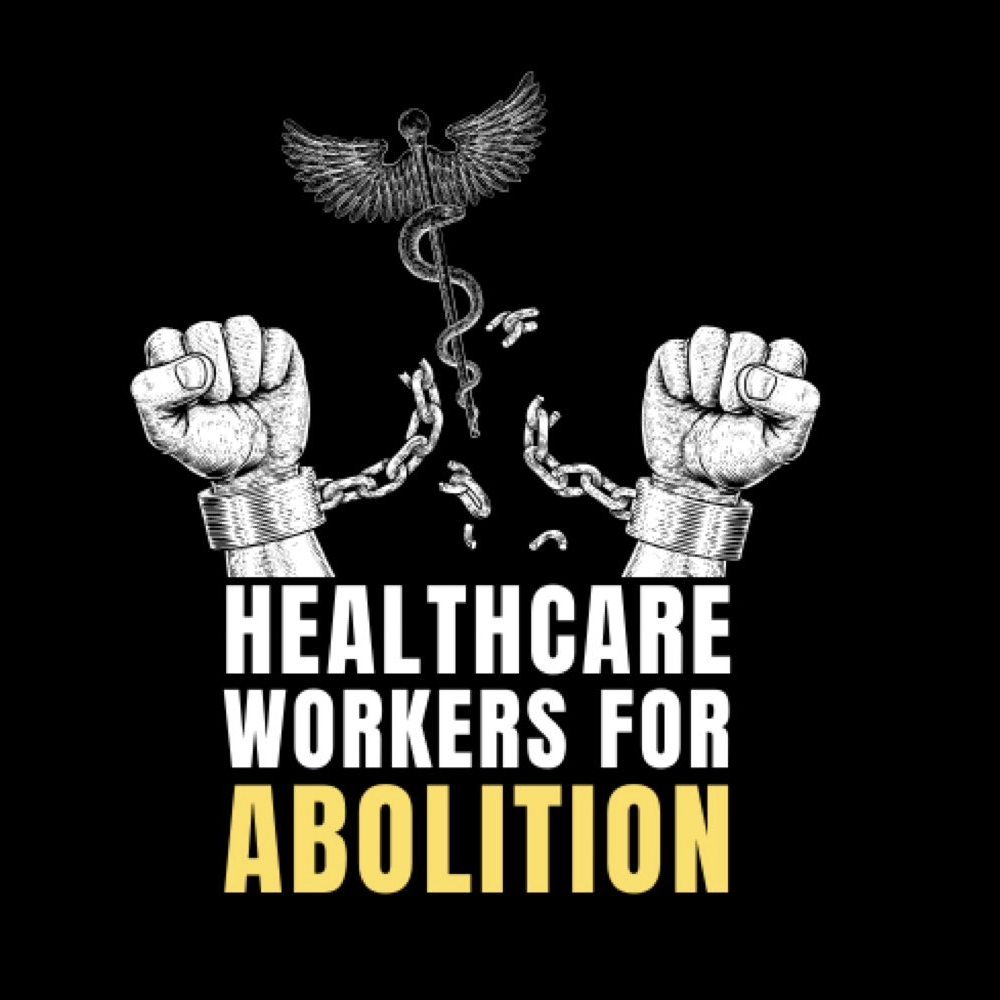Check out the resources that inform our movement.
SFDPH-Specific Resources
HCW4A Linktree
Check out our linktree to get the most up-to-date information on our campaigns and SFGH-specific resources on navigating police presence, contacting or visiting patients in custody, medical advocacy, and current hospital policies.
Toolkits
The Beyond Do No Harm Principles
The Beyond Do No Harm Network is a group of US-based health care providers, public health workers, impacted community members, advocates, and organizers working across racial, gender, reproductive, migrant and disability justice, drug policy, sex worker, and anti-HIV criminalization movements to address the harm caused when health providers and institutions and public health researchers and institutions facilitate, participate in and support criminalization.
They offer thirteen principles for supporting people’s agency, self-determination, dignity of risk, and general well-being.
A Medical Provider Toolkit for Protecting Patient Privacy
This toolkit is designed to educate medical providers on the laws and legal consequences that inform their contact with police. Although healthcare workers are often best positioned to safeguard patient privacy, they may not have the legal training, expertise, or time to best defend patient rights. Providers may be unaware of how even minimal interactions with police can adversely affect their patients. Our goal is to inform ED healthcare providers and other workers about the risks of police presence in the ED, provide guidance on how to protect patient rights in interactions with law enforcement, and offer advice on how to advocate for institutional policy changes in a hospital or healthcare network.
Toolkit for non-profits
“Whose Security? underscores the reality that institutional violence within community centers, healthcare organizations, and social services, in concert with the “helping” industry’s increasing collusion with and reliance on law enforcement, fuels the prison pipeline. The toolkit is a wonderful teaching document for those who are working with future medical professionals, social workers, educators and youth workers. It is equally relevant to the work of current administrators and staff in social services and education settings. You will find resources, ideas and tools that will enhance your practice & create safer spaces.”









Articles
Take the Punishment out of Healthcare
Written by Karim Sariahmed and Vanessa Van Doren, this 2017 piece from Medium highlights the complexity of intertwining medical care with police violence.
A Touch of Delirium and a Silver Badge: Challenges of Integrating Security and Healing in Hospitals
A 2017 piece by UCSF physician Juliana E. Morris examining the intersection between law enforcement and healthcare here at SFGH.
Abolishing Policing Also Means Abolishing Family Regulation
This June 2020 article by Dorothy Roberts in The Chronicle of Social Change highlights the problematic plan to divert funds to child welfare authorities which will lead to increased state surveillance and control of black communities.
We Can’t Just Replace Cops With Social Workers
A July 2020 Slate article by Jonathon Foiles that critically reviews concepts around expanding role of social workers to replace law enforcement.
When Health Care And Law Enforcement Intersect In Trauma Care, What Rules Apply?
A 2018 Article by Sara Jacoby, Elinore Kaufman, Therese Richmond and Daniel Holena from Health Affairs. Discussion around intersection of law enforcement and healthcare from policy and oversight perspectives.
Cops Are Illegally Detaining and Hurting Mental Health Patients
A January 2020 Vice article by Molly Taft that delves into Vermont’s harmful use of law enforcement in emergency rooms.
Podcasts
This American Life: Episode 579, My Damn Mind
In this episode from 2016, Alan Pean - an unarmed, handcuffed patient - is shot in his hospital room.
Justice in America: Podcast by The Appeal
Hosted by Josie Duffy Rice, president of The Appeal, along with guest hosts Darnell Moore, Donovan X. Ramsey, Derecka Purnell, and Zak Cheney Rice. Each episode explains a new criminal justice issue and features conversations with experts and advocates.
Websites we like
Interrupting Criminalization: Beyond Do No Harm
The Beyond Do No Harm Network is a group of US-based health care providers, public health workers, impacted community members, advocates, and organizers working across racial, gender, reproductive, migrant and disability justice, drug policy, sex worker, and anti-HIV criminalization movements to address the harm caused when health providers and institutions and public health researchers and institutions facilitate, participate in and support criminalization.
They offer thirteen principles for supporting people’s agency, self-determination, dignity of risk, and general well-being
Transform Harm
“TransformHarm.org is a resource hub about ending violence. It offers an introduction to transformative justice. Created by Mariame Kaba and designed by Lu Design Studio, the site includes selected articles, audio-visual resources, curricula, and more. You can use what is here, and submit recommendations to be added to the focus areas listed here. We hope you will use these materials to foster your own education and also share them with your communities to build something new. Only together can we transform our relationships to each other and society. We hope that this site helps in this effort.”
8 to Abolition
“1. Defund police. 2. Demilitarize communities. 3. Remove police from schools. 4. Free people from jails and prison. 5. Repeal laws that criminalize survival. 6. Invest in community self-governance. 7. Provide safe housing for everyone. 8. Invest in care, not cops. The end goal of these reforms is not to create better, friendlier, or more community-oriented police or prisons. Instead, we hope to build toward a society without police or prisons, where communities are equipped to provide for their safety and wellbeing.”


















